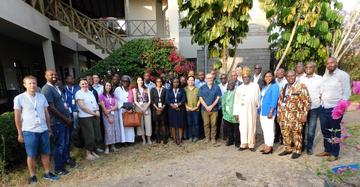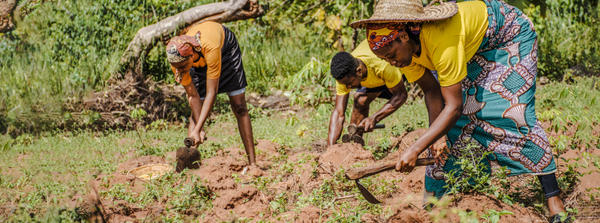Fostering agro-ecological transitions in the humid tropics of Central and Eastern Africa through "living laboratories" - CANALLS
Project start date:
01/01/2023Project end date:
31/12/2026Objectives
The humid tropics of Central and Eastern Africa hold great promise for improving food and nutrition security in Africa and beyond.
With a rich variety of agro-ecological zones and farming systems, they are home to a large proportion of the rural population and a wide diversity of living organisms, offering vital ecosystem services and great potential for sustainable development. But harnessing this potential requires tackling the complex environmental, social and economic challenges facing these regions, challenges that are sometimes exacerbated by conflict and high levels of vulnerability.
In this context, CANALLS aims to foster agroecological transitions in the humid tropics of Central and Eastern Africa through transdisciplinary, multi-stakeholder Agroecology Living Labs (ALLs). Living Labs are defined as open, user-centred innovation ecosystems based on a systematic co-creation approach, integrating research and innovation processes in real communities and environments.
Location
Burundi, Cameroon, Rwanda, Democratic Republic of Congo
Description
Eight ALLs (Agroecology Living Labs) are being set up initially in Burundi, Cameroon, the Democratic Republic of Congo and Rwanda, working alongside more than 20,000 farmers and stakeholders in the value chains. The aim is to enable all these stakeholders to co-create and benefit from optimal combinations of agroecological practices based on crops that are vital for subsistence and economic development (cocoa, coffee, manioc, rice and maize). In parallel, the project engages in strong multi-stakeholder collaboration with rural communities, advisory services and governments to develop a holistic evaluation framework and assess the socio-economic and environmental performance of the co-created practices (taking into account trade-offs and synergies).
The evidence generated is used to build capacity and share knowledge (practice summaries, replication guidelines, policy recommendations) as well as to provide equitable, inclusive and sustainable business models and services and tools to facilitate market access and improve demand for agroecological products.
The vision of the project is to create an expanding network of ALLs that takes advantage of European Union-African Union cooperation to conduct transdisciplinary research, offer scientific support and take coordinated action with the aim of providing holistic solutions that help create favourable conditions for agro-ecological transitions.
The expected outcomes of the CANALLS project are as follows:
- living agroecology laboratories engaging multi-stakeholder communities in transdisciplinary research are established to identify and co-create the conditions and tools to support agroecological transitions;
- practical tools are co-developed to identify combinations of agroecological practices adapted to the humid tropics of Africa, and to monitor and measure their socio-economic and environmental performance;
- services and marketing tools are co-designed to increase demand for agro-ecological food products, and to develop fair proposals and economic models to ensure financial viability and facilitate market access;
- agroecological strategies adapted to the humid tropics of Africa are co-created, tested and evaluated, addressing the complex socio-economic and environmental challenges of food systems, in line with policy priorities;
- the adoption of agroecological practices is supported and strengthened, taking advantage of knowledge exchange, policy dialogues and coordination with key networks for the dissemination, exploitation and replication of these practices.
Video presentation of the project
Partnership
22 partners European and African universities and research centres, NGOs and farmers' associations, production companies: Q-Plan, IITA, Eidgenoessische Technische Hochschule Zuerich, Hohenheim, Nibio, Rikolto International, Université catholique de Bukavu, Association paysanne pour le développement intégré au Sud-Kivu, Inera Congo, Association of German Development Services, Irad, Cameroon Forum for Agricultural Advisory Services (Camfaas), Scoopman-Coop/CA, Isabu, Capad Shirukubute, Rwanda Agriculture and Animal resources Development Board, Coped Ltd, Maggot Farm Production LTD, AATF, African Forum for Agricultural Advisory Services and Naturland.
CIRAD units involved: Aïda, ABSys, ECO&SOL, Innovation
Teams
Estime & Management teams - Animation :
Marc Corbeels
Jean-Michel Harmand
Thimothée Cheriere
Diego Cerrudo
Ludovic Temple
Brigitte Pogam
Fundings
European Union, 6 645 513 €

